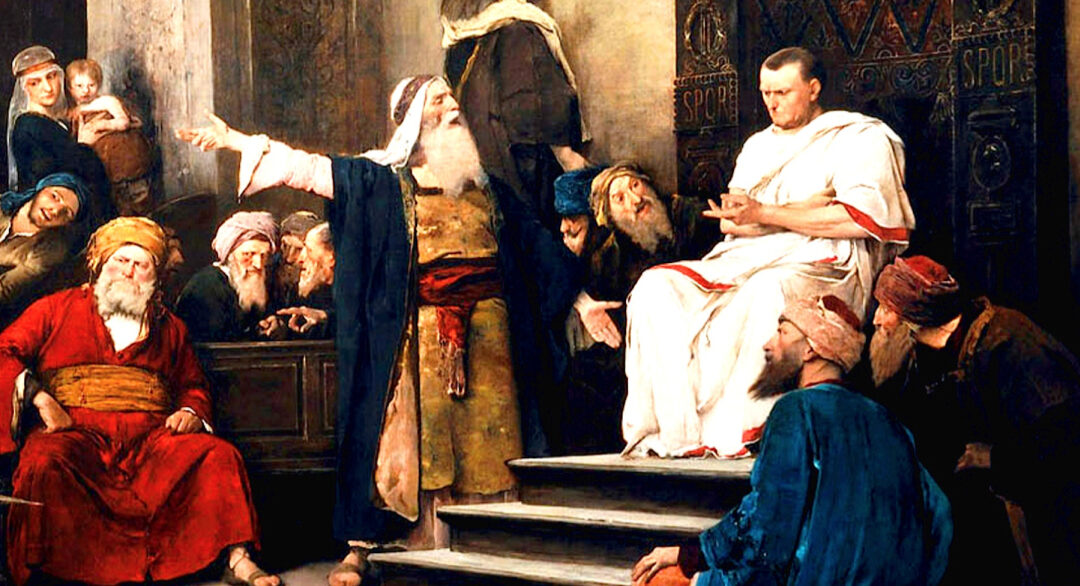“And the whole multitude of them arose, and led him unto Pilate,” (Luke 23:1).
One of the greatest ironies of Christ’s arrest and subsequent death was the fact that it was the Jewish religious leaders who prided themselves in their knowledge of the Old Testament law that had him arrested. It was the chief priests and pharisees that made the business deal with Judas to betray him and appointed the band of soldiers that captured him. And it was this same group that beat him, mocked him, and spat on him – very uncharacteristic behavior for priests and synagogue leaders.
Their next move was to turn him over to the governor because, as they themselves explain, “It is not lawful for us to put any man to death,” (John 18:31). So they led him bound from the high priest’s hall to the governor’s palace to proceed with his accusations, and so to his sentence of death. This decision came about not because of their love and loyalty to justice, however, but because they lacked the power to legally sentence him. At the same time, their warning to the government officials was threateningly clear, “If you let this man go, you are not Caesar’s friend,” (John 19:12).
Within the next few hours, a total of four accusations were brought against Christ, all of which demanded the death penalty: sedition, seduction, usurpation, and blasphemy.
1) Sedition (insurrection or rebellion). Christ was accused of “stirring up the people” with his teaching (Luke 23:5).
2) Seduction (to cause to err from the paths of truth, duty, or religion). “He perverts the nation, forbidding to give tribute to Caesar,” (Luke 23:2).
3) Usurpation (the wrongful seizure of something by force, to take something not rightfully yours to take). “He says that he himself is Christ, a King; and he that makes himself a king speaks against Caesar,” (John 19:12).
4) Blasphemy (because he claimed to be God). “We need no further witness, you have heard the blasphemy,” (Mark 14:63-64).
It is true that Christ’s teachings stirred up the people, but it was to nothing more than the life of holiness and love required to be his disciple (Mark 10:21). He was certainly not inciting them to rebel or overthrow the Roman government of that day.
In fact, he was so far removed from seduction or perverting the nation in regard to truth or duty to their government that all they need do to know they had no better champion was to observe his life (Mark 12:17). How resolutely by his teaching did he vindicate and refine the Old Testament Law, and how absolutely by his life did he fulfill it perfectly? These were the two ends of his coming, teaching, living, and dying – to restore and fulfill the law (Matthew 5:17).
And as for usurpation, so far is he from the least ambition or desire of usurping at this point in time (John 7:6), that when he knows the people want to make him king, he disappears from their midst and retreats to the mountain alone (John 6:15). Though he is the sovereign God of the universe, he came first to serve, and deal with sin. Indeed, one day he would indeed reign as King of kings and Lord of lords, after his resurrection, but not until God’s timing and plan were complete.
Finally, concerning his claim to be God and their accusation of blasphemy, he was never guilty of any kind of blasphemy in any way, at any time. He is God (John 10:30), and it is impossible for him to deceive or lie. The reason his accusers could not see it, and accused him of such, after all his works and miracles, is because God blinded their eyes to the truth in order to use them to fulfill his grand plan of redemption (John 12:40, Isa. 44:18), and they preferred their interpretation of their own kingdom instead of God’s Kingdom. God’s will, plan, and goals for creation and for his people cannot and will not ever be thwarted. Even these malevolent, evil, wicked, enraged accusers of Christ were carrying out God’s plan to the letter.
So let us believers take courage and comfort in the truth that no matter how hopelessly wicked the world around us seems, this too is part of God’s work to bring Christ to the throne and all his enemies under his feet (Rom. 14:9-11, Heb. 10:12-13, Phil. 2:6-11).
Contemplations:
- O my blessed Savior, you who are both Judge and Advocate of that great court of heaven, became for me an accused, an arraigned prisoner here on earth. What does it mean, Lord, that you once challenged your accusers by saying, “which of you can rebuke me of sin?” And yet you are here in this way still silent to all their accusations before Pilate?
- Lord, when that old accuser of the brethren shall lay to my charge things that I well know I am guilty of (Rev. 12:10), my silence will not be as yours, because you were the innocent Lamb of God. Rather, I must plead one thing, and one thing only, and that is that the blood of Christ has cleansed me from all those sins (1 John 1:7, Rom. 8).
- You, O Lord, as silent as you were, could “have smitten the earth with the rod of your mouth, and with the breath of your lips have [could have] slain the wicked,” (Isa. 11:4). But for the wicked in hell, all the breath of their lips will not be able to cool their own tongue. As for me, I cannot simply request you to pardon me, for unless you blot out that litany of accusations against me I would be left to call for the rocks and mountains to fall on me and cover me (Col. 2:14).
Further References for Luke 23:1:
Matthew 27:2; John 18:28; Acts 4:27; 1 Tim. 6:13


